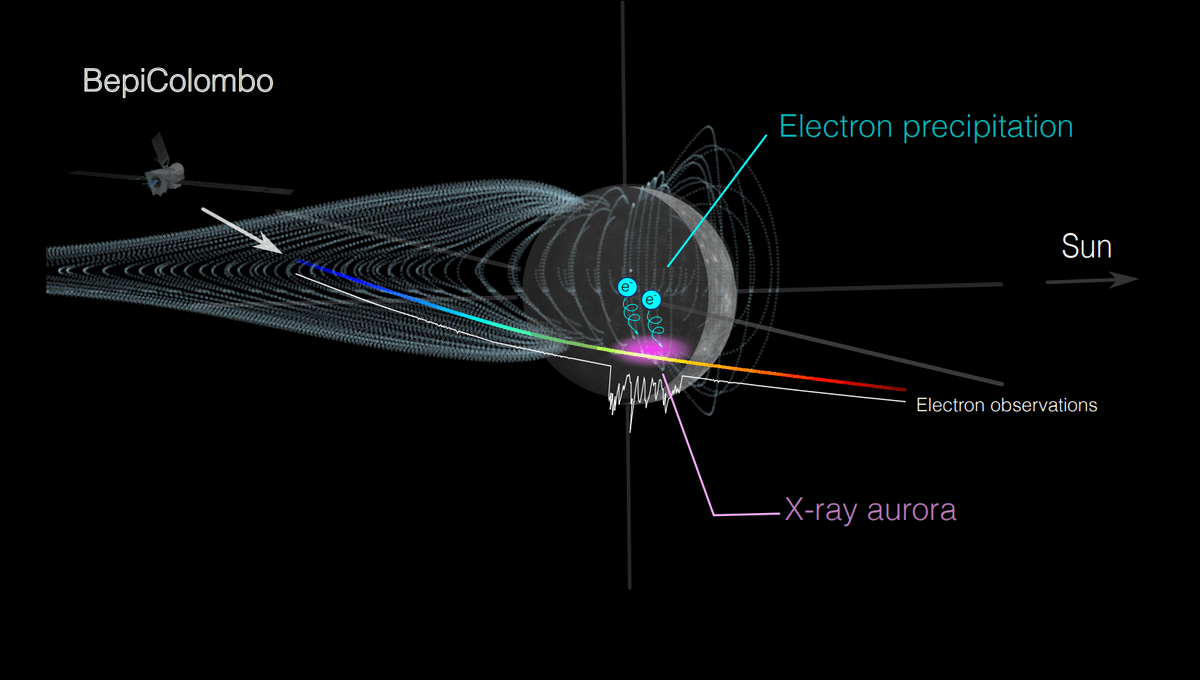
On Earth, aurorae, also known as the northern and southern lights, are produced by the interaction of charged particles from the Sun with our planet’s atmosphere. They follow the magnetic field of our planet and end up hitting oxygen and nitrogen in the air creating the spectacular colors we see. There is auroral activity in other wavelengths too, such as ultraviolet and X-rays, which has been spotted on other planets (as well as Comet 67P and a brown dwarf). Now we can add Mercury to the list too.
A new study using data from BepiColombo’s first flyby of the smallest planet in 2021 revealed that Mercury’s southern magnetosphere aurorae are similar to those seen on both Earth and Mars. This suggests that the mechanisms that spark aurorae in magnetospheres may be the same throughout the Solar System.
The joint European-Japanese mission’s Mercury magnetosphere orbiter (Mio) analyzed how the planet interacts with the solar wind’s plasma. Mercury’s magnetic field is just over 1 percent of Earth’s own, but it still affects the solar wind. For the first time, the team observed the rain of plasma, particularly electrons, that precipitate down on the planet. This had been predicted to take place based on previous data from MESSENGER, but it had never been observed before now.
Another difference between Mercury and other planets is the lack of atmosphere, so thin that it gets the name “exosphere”. Due to this thin exosphere, the electrons reach all the way to the surface, making the very rock fluoresce with X-rays. While the aurorae in Earth’s atmosphere are different from Mercury’s glowing surface, the mechanism is the same. Plasma rains down on a planet’s component and it makes it glow.
“We include X-ray fluorescence from the surface as aurorae because its mechanism is the same, which means that any other Solar System bodies or exoplanets without a thick atmosphere may also have it. Thus, I expect them to be a lot more common in the universe in particular where there is a magnetic field,” lead author Dr Sae Aizawa, from Institut de Recherche en Astrophysique et Planétologie, told IFLScience.
BepiColombo is using flybys by Mercury to slow down and get into orbit around the planet without using up precious fuel. When that is achieved in a few years, the mission’s two main spacecraft, Mio and the Mercury Planetary Orbiter (MPO), will split looking at the planet from two different orbits. Then scientists will be able to look for the X-ray aurora coming from the surface of the planet as well as better understand how the magnetic field, the solar plasma, the exosphere, and the planet’s surface relate to each other.
“Measurement of X-ray will be performed by SIXS (Solar Intensity X-ray and Particle Spectrometer) onboard MPO, which will orbit closer to the planet, and electrons with wider range will be observed by MEA (Mercury Electron Analyzer) onboard Mio, which will have a bit different (farther) orbit,” Dr Aizawa told IFLScience.
BepiColombo has barely begun doing science and won’t reach Mercury orbit until 2025 but there are already great things coming from the mission, with plenty more to come.
The study is published in the journal Nature Communications.
Source Link: Plasma Rains Down On Mercury Making It Glow With Aurora-Like Activity